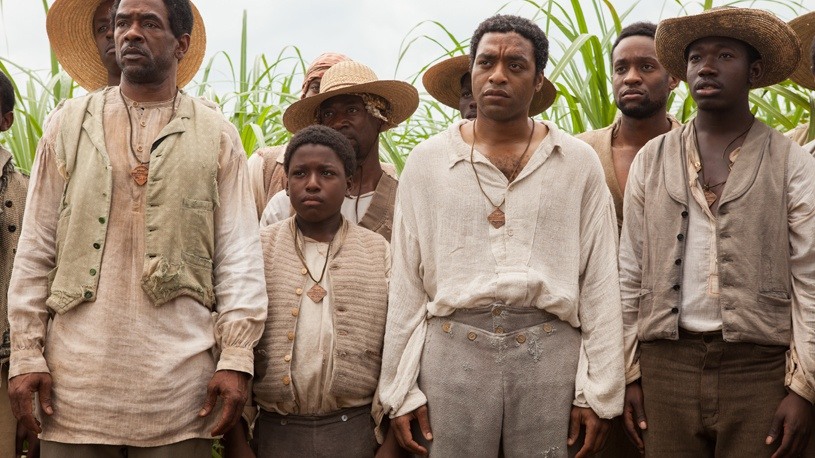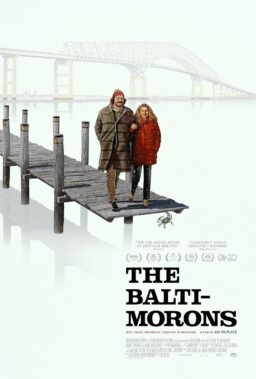Steve McQueen’s “12 Years a Slave,” is a history lesson taught with silence of a clenched fist. You may cry, scowl, and scream when watching this film, but you will not cheer. We cheer for heroes in costumes. Here, there are no costumes. Just wounded, torn flesh. Here, the heroes are those who can maintain self-respect. Here, we do not applaud, but weep. In our historic culture of slavery, it was generations, time and the whip that reduced those heroes. For two hours covering twelve years, you watch a man robbed of everything, struggling to hold on to what remains of his sense of self as a system tries to dismantle his dignity.
In Upstate New York in the late 19th Century, it was possible for Black Americans to mingle freely with whites, while some enslaved were nonetheless present. Solomon Northup (Chiwetel Ejiofor) sings through his violin to audiences of high culture. This is a genteel world of civility disconnected from the massive primitive plantations of the South. The only connection these Yankees have to their Dixie counterparts would be the fine cotton wares they purchase, ignoring the shackled hands that picked that cotton.
Dignity, here, displays itself through formal language, tailored attire, and classical music. That is, until white hucksters in suits come to town to intoxicate and kidnap free Blacks and sell them as property. While the economic and cultural institution of American slavery sought to turn Northup into a beast, his challenge over the twelve years—while hoping to return home—was to will himself to continue not just as a man, not just as a free man, but as the man he was and is. Maslowe wrote about the hierarchy of needs; this story is about the step-by-step crushing of spirit. This film takes us through the process as a lecture in dehumanization. The point in the following list is that slavery was such an institution that the process of destruction and dehumanization was calculated and deliberate. Enslavement was a conscious culture, without anything arbitrary.
The first step is the disorientation, debilitation, and isolation. Northup, meets some potential employers. After they work together, they take him out for a meal and drink heavily. Unable to hold his liquor, he is out cold, in between spells of vomiting. He wakes up in a dungeon. Burch (Christopher Berry) enters: a white man with a scraggly beard and a frown. Despite Northup’s resistance and protestations, he beats him into submission.
This step gets fiendishly softened when one of Northup’s captors offers a clean shirt to replace the tatters. He presents it as a favor, reprimanding Northup for his lack of gratitude, though we know it is to make Solomon marketable.
The second step is the animal pen. The next morning, Northup is stripped of his clothes with a few others. They have these few moments to awaken and regain their senses, while getting hit with water and soap. What is the new reality, but life among pigs. Northup and the others remain aloof from each other, but slowly warm up—as much as that is possible in this situation. They bond. Soon, they get imprisoned in the hull of a ship, trapped with rats.
The next step is the erasure of identity. No longer allowed to be known by his real name, Northup is now Platt. If he insists on using his real identity, he gets beaten. You no longer own your own self. Your master owns everything about you, starting with your name.
The fourth step is the dismantling of the family. There are two parts here. On the one hand, each of the enslaved now has to present his/her skills in the marketplace, knowing well that s/he will be traveling from one horrible lot to another. On the other hand, as commodities, ties of family are irrelevant. Solomon watches as Eliza’s (Adepero Oduye) family gets severed. She begs and gets ignored. Because anyone with even the slightest bit of compassion would feel her pain, her owner Freeman (Paul Giamatti) makes the others of the enslaved play music and clap to cover her pleas.
And, performance is itself a calculated seduction. If the master can make the enslaved dance, sing and clap, then perhaps the enslaved can forget they are enslaved. Or, if the master cannot make the enslaved live in some imaginary world, then at least the music can drown out the screaming and moaning. And more than that, choreography creates monotony in the garb of activity: get the enslaved to sing and perform mechanically, and somewhere in the promenade is the impression of joy.
It follows, then, that the sixth step is the imposition of religion. Much has been said about the real or alleged role of indoctrinating Christianity onto the enslaved. Every religious population has slavery and exploitation in its history (if not also in its present). Inquisitions took place to bring grace to the unsaved, but here, the strategy is different. In “12 Years a Slave,” religion is purely a tool, using theology to disempower. “God will take you to the Promised Land, so until then, sit tight and do your work, and sing your hymns.” While religion might provide motivation for institutionalized violence, here it is itself subjugated to subjugate.
And, of course, a seventh step is forced illiteracy. The only literature the enslaved are given is scripture. The central proof for Solomon’s story is his literacy, and thus it is his greatest liability. If his masters discover he can read and write, he is a dead man.
Perhaps the worst attack on dignity, however, was in turning enslaved against enslaved, actively or passively. Take, for instance, two scenes, almost next to each other. In one, Epps (Michael Fassbender) wants to whip Patsey (Lupita Nyong’o), but forces Northup to do it, at gunpoint. Either Northup whips her, or he gets killed. In romantic fiction, he would choose death. This is not fiction. In another scene, Patsey asks Northup to kill her, and free her from her horrible life. Again, in fiction he would do it and we would weep. In fiction.
What do we make of the masters in this film? Is there a single man among these men? They too suffer their own upper-class dismantling. Each one seems inhuman, yet gets surpassed in brutality and bestiality by the next. Freeman (Giamatti) sees nothing but product as he lines up his people. In his world, there are humans, there are beasts of burden, and in between are the enslaved. If the enslaved seems to aspire to humanity, he beats them back into submission.
Ford (Benedict Cumberbatch) seems to have a conscience somewhere in his chest in that space where his heart used to beat. He sees himself as a business owner, a manager, working his way out of debt. The slavery becomes a necessity for him to maintain his lifestyle.
Briefly, we meet master Shaw, who has fallen in love with his servant (Alfre Woodard), abandoning his wife for her. And, what do we learn? In the pages of popular fiction, the new Mistress Shaw would resist his advances, and reject any opportunity to sit in the throne of mastery over other enslaved peoples. But, that is romance, not reality. Her lesson is that if you can improve your lot, then you must do it, even if it means you perpetuate the barbarous system upon others while you sit for high tea.
And, then there is the very insane Epps (Fassbender). His wild demonic blue eyes read Scripture into everything. The season’s crops suffer disease, he feels, because of sin. He stands powerless on the one hand against his stern wife, and on the other against his desires for “his” Patsey (Nyong’o). And consider those desires. Not only does he take her as property, not only does he rape her each night, but he does so while she is covered with days and days worth of stench from working the fields. That is the behavior of a predator. He is the real animal in this film, with eyes fixated on his prey. He is at the level of swine in the pen, or worse, because the swine know to behave like swine.
So, according to McQueen’s film, who is to blame, then for this crushing environment? Is it the master? No, for every master in this film is himself half a man. Is it Christianity? No, for Christianity gets used as a device just as much as the noose. Perhaps the answer comes in an early scene. Northup and family walk into a shop to purchase a shawl before Anne (Ashley Dyke) heads out of town for a job. In all likelihood the shawl she chose was made from the cotton that was picked in the plantations a thousand miles to the south. Who is to blame for this crushing environment? Trade, economics, and the subsequent blind eye we all turn to the atrocities that allow us our lifestyles. Solomon Northup’s central challenge throughout the film was to maintain his humanity above the bottom line of the market.
In that same scene, Northup almost ignores Jasper (Marcus Lyle Brown), an enslaved man surprised to see another Black American shopping in freedom. The film’s end scroll tells us that Northup became an active member of the Abolitionist movement. It seems that he also saw the other side of the lifestyle he himself lived.
And, with that, this film has me wondering how many are subjugated by my own lifestyle, at home and abroad.












